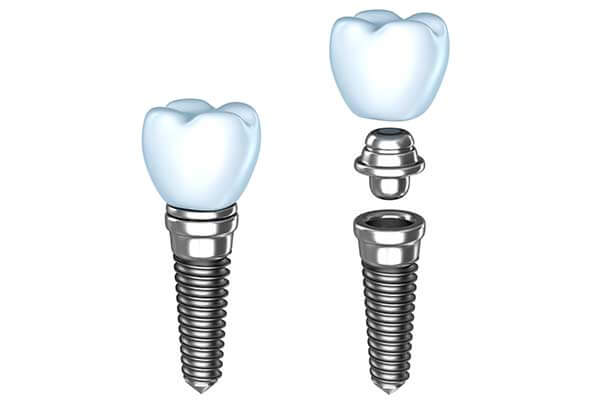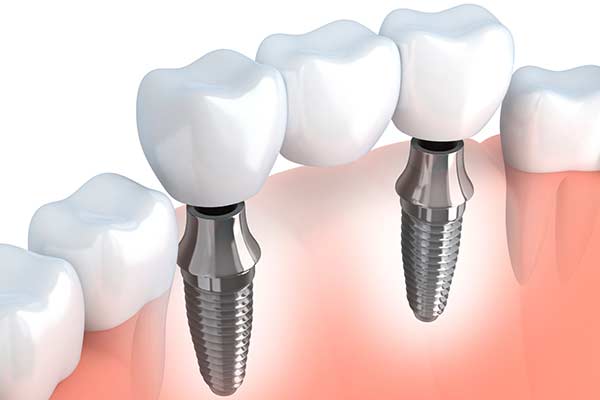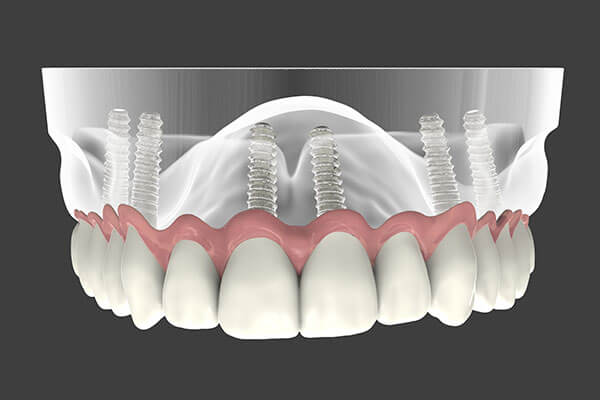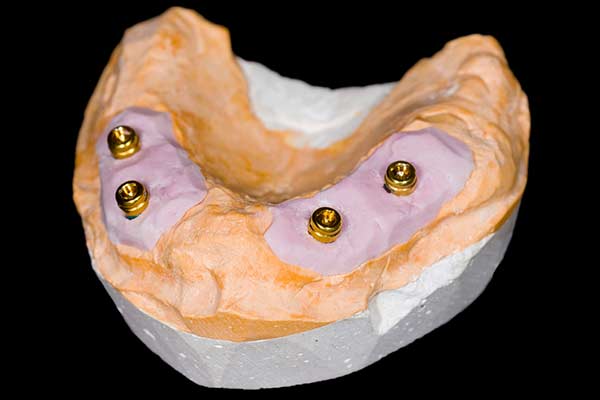Dental Implants
Single Tooth Dental Implants

Dental implants replace tooth roots in the mouth. Implants provide a strong foundation for fixed or removable replacement teeth and can aid in the prevention of bone loss in the jaw.
Implant Supported Bridges

An implant supported bridge is a restorative solution for spaces where three or more adjacent teeth are missing. This restoration typically requires two implants to support the porcelain bridge. The bridge provides a functional and aesthetic replacement for a patient’s natural teeth.
Implant Supported Dentures

For patients who are missing many or all of their teeth, implant supported dentures may be an alternative to traditional dentures. This solution requires the placement of two or more implants. In order to replace a full arch denture, a minimum of four implants is generally recommended. Eligibility for this solution is dependent upon a number of factors, with jaw bone density being one of the most significant determining factors.
Traditional dentures rely on an acrylic base that sits directly on the gums, held in place by a paste or adhesive. Using implants as supports for dentures allows for a smaller and more comfortable base and less shifting of the prosthesis during use.
Implants can support both full and partial dentures as well as both fixed and removable dentures. If a removable denture is selected, the denture will “snap” on to the implant rather than requiring the use of denture paste or adhesives.
Full Arch with Only Four Implants

This procedure is a unique implant solution that allows patients with a completely edentulous (toothless) upper or lower arch to replace all of the teeth in that arch using only four implants as anchors.
Guided Implant Placement

With this technique, specialized software is used to create custom surgical guides. These guides direct the exact location, angle, and depth of each implant placement. The use of the guide increases the accuracy, efficiency, safety, and predictability of the procedure.
Dental Implants FAQ
What are dental implants?
Dental implants are permanent, non-removable, root-shaped screws placed into the jawbone. Once in place, they can support a single crown, a bridge, or a denture.
What are the benefits of dental implants?
Dental implants are a safe, proven, permanent solution for replacing teeth. They are a conservative approach compared to some traditional dental procedures. For example, they can be used to replace a single missing tooth without having to involve the surrounding teeth like a conventional dental bridge. They also offer a wide range of treatment options that can help replace larger segments of missing teeth or even all the teeth, in the case of people who would otherwise need dentures.
Are dental implants right for me?
Most people who are medically stable are good candidates for dental implants. There are a few conditions that may make getting implants more difficult.
Are dental implants safe for senior citizens?
Absolutely. Dental implants were initially targeted to treat people who were missing all their teeth (typically seniors) and suffering from the related quality of life issues. Later, implant use was expanded to treat less severe cases, such as single missing teeth or segments. Patients simply need to be medically stable to receive dental implants.
Are dental implants as strong as natural teeth?
Dental implants are made from a robust titanium alloy, which in many ways makes them stronger than natural teeth. Presently, they are certainly the best option we have to permanently replace teeth.
Does a dental implant hurt?
During the procedure, patients should not experience any pain. Most people report only minimal discomfort afterward.
How much do dental implants cost?
The cost of a single dental implant is usually in the $2000-$2500 range but the overall expense varies greatly depending on the specific treatment plan for a particular patient. For example, the implant(s) might be intended to support a single crown, a bridge, or a denture. In the most common scenario- a single tooth replacement- the fee is around $4500, which is comparable in cost to the traditional treatment to replace a tooth, a dental bridge.
How long does it take to get a dental implant?
The time can vary between the same day (where the tooth is taken out and the implant placed immediately), to several months if bone augmentation of the future implant site is needed. Typically, if a tooth is already missing, it takes about three months for the implant to stabilize, at which point the crown can be made.
What are the steps in getting a dental implant?
The first step is always a comprehensive exam and a 3D image of the jaw. If a defective tooth is present, it will need to be removed prior to placing the implant. This requires 3-4 months of waiting for the area to mature. The implant can then be placed but needs to remain out of the bite for 2-4 months, (depending on the site) before it is ready to use.
How long after an extraction can I get a dental implant?
Most commonly, 3 months. If the extraction site is deficient in bone quantity, augmentation may be necessary to enhance it, which could add a few additional months to the time frame.
What can implants do to improve the fit of my denture?
Implants can dramatically improve the grip and stability of a denture by providing a means for the denture to securely snap into place. With enough implants, a patient can even eliminate the need for a denture at all.
What is the difference between dentures and dental implants?
If a patient has lost all their teeth, they have two options- dentures or implants. Traditional dentures have no support and simply sit on the soft tissues in the mouth. They can be very mobile which irritates the gums and makes eating difficult. Implants can make a denture more comfortable and stable by providing some anchorage and minimizing movement. With multiple implants, it is possible to create a prosthesis that more closely resembles natural teeth in form and function. This includes options that are non-removable, like natural teeth.
The Benefits and Importance of Dental Implants
Want to know more about why you should choose dental implants?
Learn More About the Benefits of Dental Implants